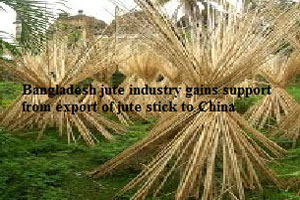
Bangladesh jute industry gains support from export of jute stick to China
YarnsandFibers News Bureau 2017-02-20 11:00:00 – DhakaMost jute farmers in Bangladesh had no idea of the true value of the versatile natural vegetable fibre. In the past, the jute sticks were only used for cleaning purpose, reports Xinhua. They discovered that the ashes of jute sticks have many applications aside from being used for cleaning kitchen utensils. The ashes, for example, can be used for making dry cell batteries, cosmetics, carbon paper, computer ink and various chemical products.
Such a realisation has seen thousands of jute farmers who grow jute, earning a fair amount from selling the sticks to factories which are equipped with Chinese machinery and overseen by Chinese technicians.
Following the establishment of Bangladesh's first jute stick processing factory, called the Golden Carbon Factory in the district, jute farmers are quickly realising the value of their natural product.
Farmers from Faridpur district has started supplying jute sticks to the factory here and can make money from the sales. This business has helped their families economically.
The ashes from the sticks are made by burning dried jute sticks at a certain temperature in special furnaces and the ashes are then crushed into jute stick carbon powder.
The manager of the Golden Carbon Factory said that the technicians and machinery for this process comes from China and that the price per maund (equivalent to about 37 kg) of jute sticks ranges from 180 taka (2.24 US dollars) to 220 taka (2.74 US dollars).
Their factory processes 14 to 15 tons of jute sticks a day and this requires two furnaces to be lit. This produces about three tons of ash from the two ovens, the manager said.
Abdul Khaliq Mollah, an administrative officer at the Golden Carbon Factory said that initially, they were buying materials from several wholesalers who purchase the jute sticks from rural villagers.
Earlier, there were 20-30 staff who are working in different factory sites set up for burning jute sticks and crushing coal but there are now 25 such factories operating on Bangladesh. These factories have created employment opportunities for rural villagers aside from just farming and menial labour, he added.
One such villager, Arif, who also works at the Golden Carbon Factory, said that he has learned a great deal of technical skills from Chinese engineers and now works as a main technician in the factory. His duty is to look after the burning process so that they produce quality ash.
Countries like Japan, Turkey, the United States, Australia, Canada and Mexico are also in demand of the charcoal powder from Bangladesh's jute stick factories.
During the fiscal year ending June 2016, Bangladesh exported jute stick carbon to China worth about US dollar 1.74 million. Bangladesh enjoys tax free market access to China when it comes to the sale of jute stick carbon.
Market Intelligence
Ask for free sample Report

experience
Customer Base
dedicated team
Countries Served Worldwide









